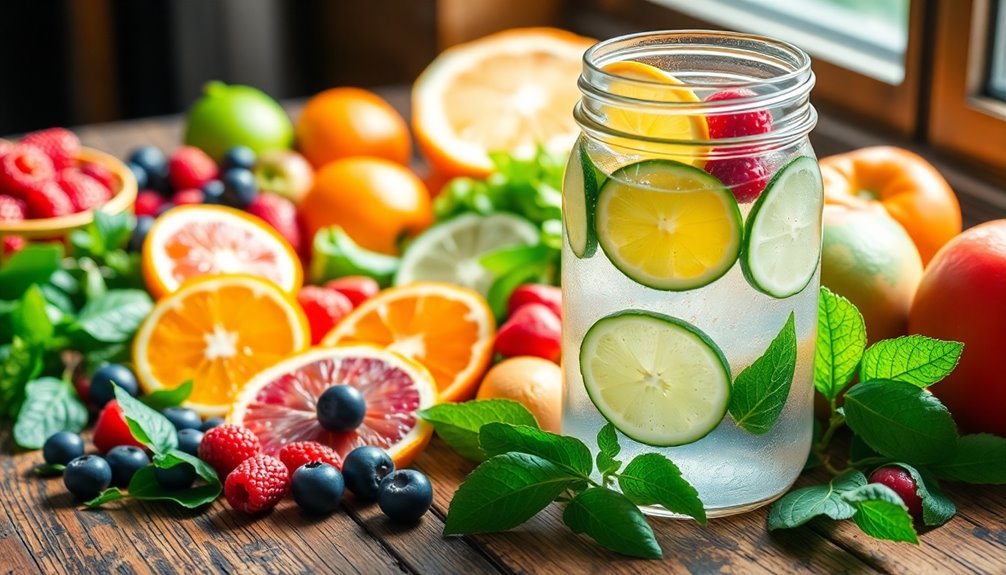Detox diets promise quick results, but experts warn they're often unnecessary. Your body has a natural detox system—mainly the liver and kidneys—that works effectively without extreme diets. While some detox plans can lead to short-term benefits like weight loss and improved digestion, they may also cause nutritional deficiencies and digestive issues. Many detox diets lack essential nutrients and aren't sustainable. A balanced approach with fruits, vegetables, and whole grains is key to good health. If you're curious about how to support your body's natural processes, you might want to explore more insights on this topic.
Key Takeaways
- Experts emphasize that the body naturally detoxifies, making detox diets often unnecessary and potentially harmful.
- Many detox diets can lead to nutrient deficiencies and negative health outcomes due to extreme calorie restriction.
- Short-term benefits like weight loss or improved digestion are often temporary and not sustainable long-term.
- A balanced diet rich in whole foods, hydration, and regular exercise is recommended for overall health instead of fad detox diets.
- Psychological effects, such as unhealthy eating patterns, can arise from rigid detox plans, impacting mental well-being.
Understanding Detox Diets
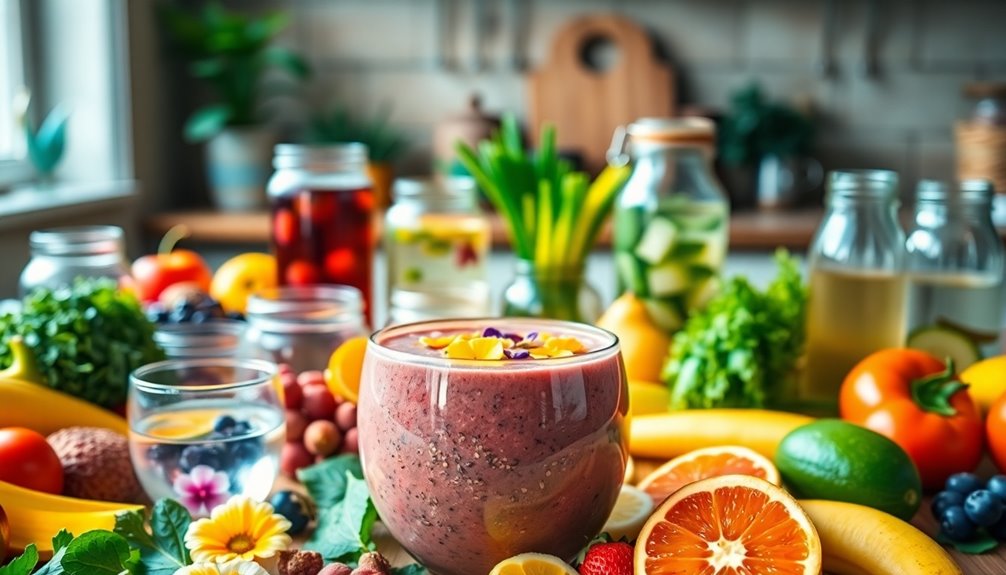
Understanding detox diets can be a bit confusing, especially with so much information out there. You might've heard various detox myths that paint a picture of quick fixes and miracle cures. It's easy to get swept up in the idea that a simple cleanse can rid your body of toxins. However, many of these misconceptions aren't backed by solid science.
Your body is naturally equipped to detoxify itself through organs like the liver, kidneys, and skin. While some detox diets promote extreme restrictions, the truth is that they often lack essential nutrients and can lead to negative health outcomes. It's important to recognize that not all detox diets are created equal; some may offer benefits while others may be harmful.
There's also the notion that detox diets guarantee weight loss, but this isn't a sustainable approach. Weight lost during a detox is often water weight, which can easily return once normal eating resumes.
Instead of jumping on the latest detox bandwagon, consider focusing on balanced nutrition, regular physical activity, and adequate hydration.
Common Types of Detox Diets
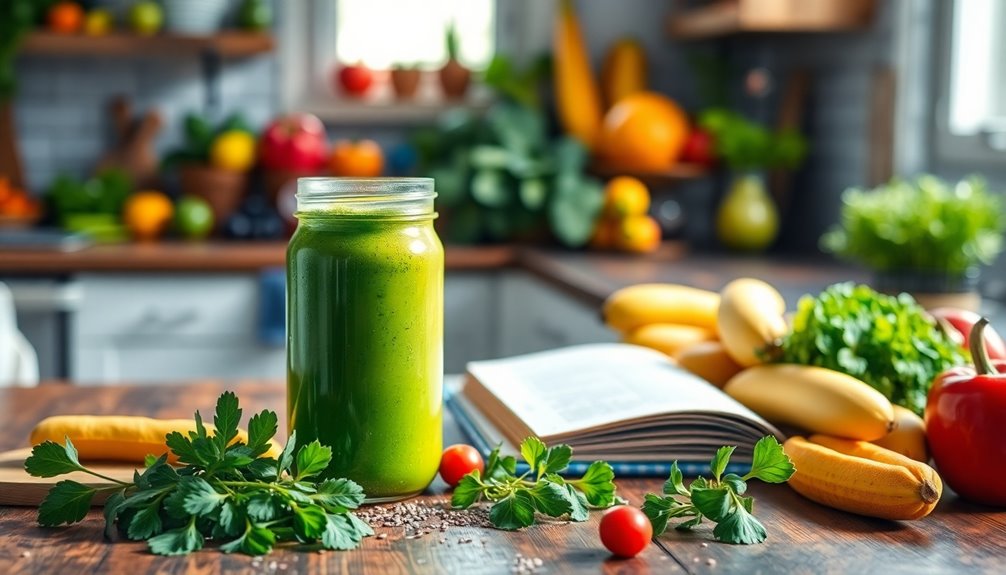
Many people encounter various types of detox diets, each claiming to offer unique benefits. It's essential to understand these diets to determine which, if any, might suit your lifestyle and health goals. Here are some common types you might come across:
- Juice Cleanses: These involve consuming only fruit and vegetable juices for a set period. Advocates say they help eliminate toxins, but the science is mixed.
- Herbal Supplements: Some detox diets incorporate herbal supplements, which are believed to support liver function and digestion. Research on their effectiveness varies considerably.
- Water Fasts: This extreme approach involves consuming only water for a specific duration. While it may lead to quick weight loss, it's not recommended for extended periods.
- Raw Food Diets: By eating only uncooked and unprocessed foods, proponents argue you can improve your overall health. However, it may lack certain nutrients.
- Elimination Diets: These diets involve removing common allergens and irritants from your diet for a time, then slowly reintroducing them to identify sensitivities.
Each of these detox diets has its supporters and skeptics. While juice cleanses and herbal supplements might appeal to those looking for a quick reset, it's vital to approach them with caution. Remember, what works for one person may not work for another, so always consider your individual health needs and consult with a healthcare professional before making notable dietary changes.
The Science Behind Detoxing
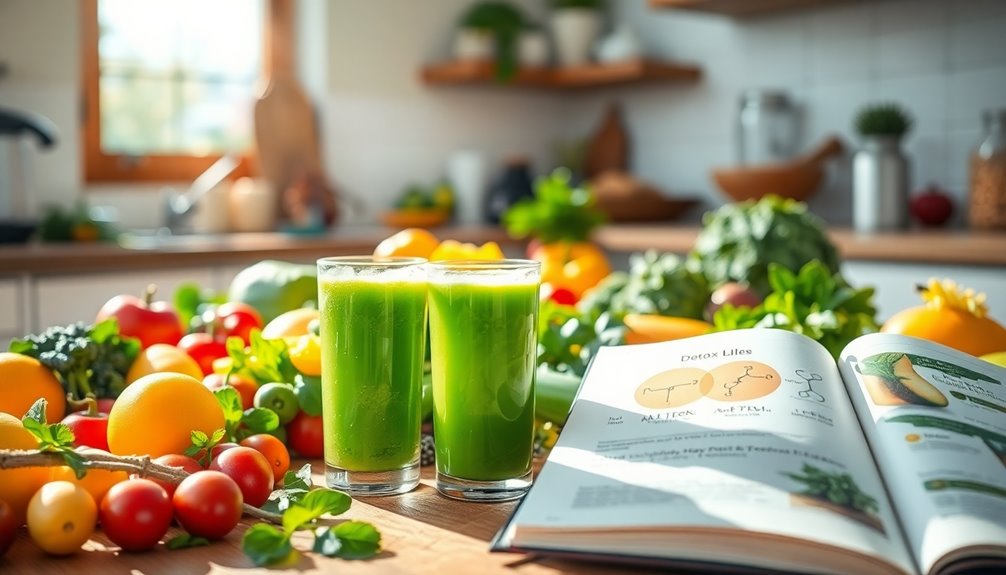
Detoxing often sparks curiosity about its scientific validity and effectiveness. You might wonder how the detox process actually works and whether it's beneficial for your body. At its core, detoxing refers to the methods used to eliminate toxins from your system, promoting cellular health and overall well-being.
Your body has a natural detoxification system, primarily driven by the liver, kidneys, and intestines. These organs work tirelessly to filter out harmful substances and maintain balance. However, factors like poor diet, environmental pollutants, and stress can overload your system, leading to a buildup of toxins.
This is where detox diets come in, claiming to support and enhance your body's natural abilities.
Research on detox diets is mixed; some studies suggest that short-term dietary changes can improve certain health markers, while other evidence points to the body's inherent capacity to detoxify itself without any specific dietary intervention. It's important to remember that while whole foods and hydration can support cellular health, extreme detox diets may not be sustainable or beneficial long-term.
In considering the science behind detoxing, balance is key. Instead of focusing solely on detox diets, you can prioritize a well-rounded approach that incorporates nutrient-rich foods, regular exercise, and adequate hydration. This way, you can support your body's natural detox processes and promote lasting cellular health without the risks associated with fad detox diets.
Potential Benefits of Detox Diets

Exploring the potential benefits of detox diets reveals a mix of claims and realities that can impact your health. While some detox diets promise miraculous results, understanding the more realistic benefits can help you make informed choices. Here are some potential advantages you might consider:
- Weight loss: Detox diets often lead to short-term weight loss due to calorie restriction and elimination of processed foods.
- Increased energy: Many people report feeling more energetic after a detox, as they consume whole foods and eliminate heavy, processed options.
- Improved digestion: By focusing on fiber-rich fruits and vegetables, you may notice better digestion and regularity.
- Enhanced mental clarity: Some individuals experience improved focus and mental clarity due to reduced intake of sugar and caffeine.
- Boosted hydration: Detox diets usually emphasize drinking more fluids, which can help you stay hydrated and support overall health.
While these benefits can be appealing, it's essential to remember that individual experiences may vary. A detox might be a great way to reset your eating habits and encourage healthier choices in your daily life. Just be sure to approach it with balance and awareness.
Consulting a healthcare professional can help you tailor a plan that aligns with your personal health goals. Ultimately, finding what works best for you is the key to achieving lasting benefits.
Risks and Side Effects

While detox diets can offer some appealing benefits, it's important to weigh the risks and side effects that may accompany them. Many people jump into detox plans, hoping for quick results, but you should be aware of the potential detox dangers involved. These diets often involve extreme calorie restriction or cutting out entire food groups, which can lead to nutritional deficiencies. Without proper nutrients, you might experience fatigue, dizziness, or even more serious health hazards.
Another concern is that detox diets can disrupt your digestive system. Some individuals report gastrointestinal issues, such as bloating or diarrhea, particularly if they use laxatives or rely on juices instead of whole foods. These reactions can make you feel worse instead of better, countering the very purpose of a detox.
Moreover, the psychological effects shouldn't be overlooked. Focusing excessively on food restrictions can foster unhealthy eating patterns or trigger disordered eating behaviors. If you find yourself obsessing over what you can't eat, it might lead to feelings of isolation or anxiety.
Before committing to any detox diet, consider speaking with a healthcare professional. They can guide you in making safe choices that align with your health goals. Remember, the journey to wellness is about balance and nourishment, not deprivation. By understanding these risks, you can make a more informed decision that truly supports your health and well-being.
Expert Opinions on Detoxing

Many health professionals express skepticism about the effectiveness of detox diets, emphasizing that the body has its own built-in mechanisms to eliminate toxins. While popular trends may promote the idea of detoxifying through restrictive diets or juicing, experts often highlight common detox misconceptions that can mislead you.
Here are some key expert recommendations regarding detox diets:
- Focus on Whole Foods: Instead of detoxing, consider incorporating more whole foods into your diet, like fruits, vegetables, and whole grains.
- Stay Hydrated: Drinking plenty of water aids your body's natural detox processes.
- Avoid Fad Diets: Many detox plans lack scientific backing and can lead to nutrient deficiencies.
- Listen to Your Body: If you're feeling unwell, it's best to consult a healthcare professional rather than relying on a detox diet.
- Prioritize Balanced Eating: Experts advocate for a balanced diet over short-term detox strategies to maintain long-term health.
Detox Diets vs. Balanced Eating

Detox diets often promise quick results, but they can fall short when compared to the benefits of balanced eating. While detox programs may offer immediate weight loss or a temporary energy boost, they often lack the nutritional balance your body needs for long-term health. Instead of depriving yourself with restrictive diets, focusing on a balanced eating approach can lead to sustainable lifestyle changes.
Balanced eating emphasizes a variety of foods that provide essential nutrients, ensuring you meet your body's needs. This approach promotes lifestyle sustainability, allowing you to enjoy your meals without the stress of strict rules. Here's a quick comparison:
| Aspect | Detox Diets | Balanced Eating |
|---|---|---|
| Nutritional Balance | Often lacks essential nutrients | Provides a wide range of nutrients |
| Sustainability | Short-term, hard to maintain | Long-term, adaptable lifestyle |
| Overall Health Impact | Can lead to nutrient deficiencies | Supports overall well-being |
When you choose balanced eating, you're not just focusing on immediate results; you're investing in your health for the long haul. You'll find that nourishing your body with a variety of foods helps create a sense of community around meals, making it easier to share and enjoy food with others. In contrast, detox diets can isolate you, often leaving you feeling deprived or frustrated. So, consider embracing balanced eating as a more fulfilling path to wellness.
Long-Term Effects of Detoxing
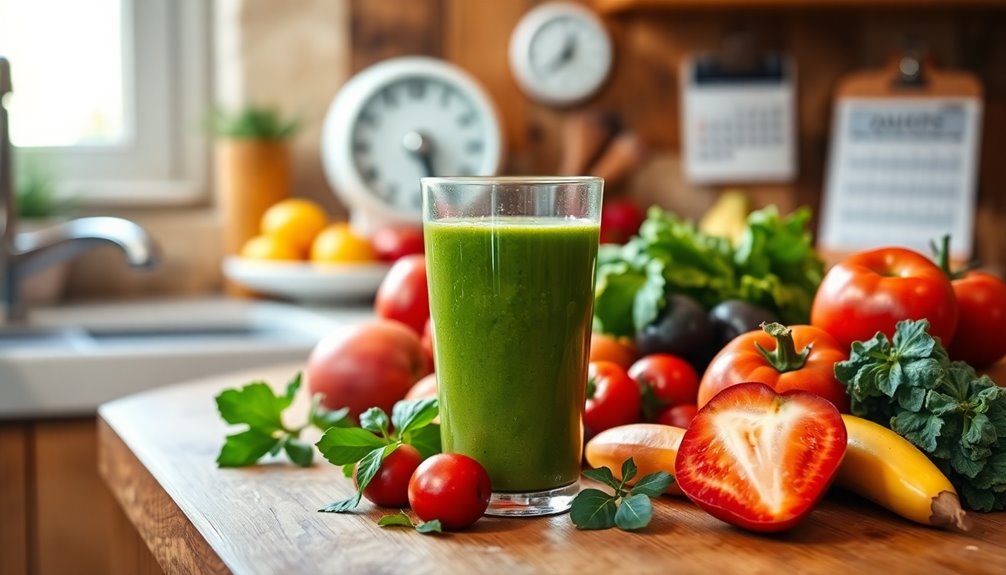
The long-term effects of detoxing can be a mixed bag, often leaving individuals with more questions than answers. While some people report feeling lighter or more energized, others face challenges that can impact their overall well-being. It's important to consider both the potential benefits and the drawbacks that may arise after prolonged detox practices.
Here are a few long-term effects to keep in mind:
- Sustainability concerns: Most detox diets aren't designed for long-term adherence, leading to a cycle of yo-yo dieting.
- Nutritional deficiencies: Many detox plans eliminate entire food groups, risking inadequate intake of essential nutrients over time.
- Metabolic impact: Extreme calorie restriction can slow your metabolism, making weight maintenance trickier in the future.
- Mental health effects: Rigid detox plans may contribute to an unhealthy relationship with food, leading to anxiety or guilt around eating.
- Physical health risks: Prolonged detoxing can strain your organs, particularly the kidneys and liver, which are crucial for processing waste.
Ultimately, while detox diets might offer short-term gains, the long-term effects could be harmful. It's vital to prioritize a balanced approach to eating that promotes sustainability and prevents nutritional deficiencies. Engaging with a healthcare professional or a registered dietitian can help you find a healthier path that aligns with your personal goals and lifestyle, creating a sense of community and support in your journey.
Real-Life Success Stories

While long-term cleansing can raise concerns about sustainability and health risks, numerous individuals have shared positive experiences that highlight the potential for beneficial lifestyle changes. Many people have turned to cleansing diets not just for weight loss but for improved energy levels and mental clarity. Take Sarah, for example. After a week-long juice cleanse, she reported feeling lighter and more focused, which motivated her to adopt healthier eating habits. Her personal anecdotes resonate with others who've found that even short-term cleanses can spark meaningful shifts in behavior.
You might be wondering how you can achieve similar results. Practical tips from those who've succeeded often emphasize the importance of preparation and gradual adjustments. For instance, instead of diving straight into a strict cleanse, consider gradually eliminating processed foods from your diet. This can make the shift smoother and more sustainable in the long run.
Many people also recommend finding a supportive community. Sharing your goals and experiences with friends or online groups can provide the encouragement needed to stick with your cleansing plan. You're not alone in this journey—connecting with others who share similar goals can enhance your commitment.
Ultimately, while not every cleansing diet works for everyone, these real-life success stories highlight the potential for positive change. By learning from others and applying practical tips, you can transition on your own cleansing journey with confidence and purpose.
Making Informed Choices

As you embark on a cleansing journey, it's crucial to make well-informed choices that align with your health goals and lifestyle. While detox diets can seem enticing, it's vital to base your decisions on credible information rather than trends or hype. Research studies reveal mixed results regarding the effectiveness of detox diets; some may offer short-term benefits, but the long-term impacts on health are often unclear.
Here are some key points essential to keep in mind when making your choice:
- Understand Your Goals: Are you aiming for weight loss, improved digestion, or more energy? Clarifying your objectives can guide your approach.
- Research Evidence: Look for scientific studies that support or challenge claims made by detox programs. Reliable sources can enhance your understanding.
- Reflect on Personal Experiences: Seek insights from friends or family who've experimented with detox diets. Their experiences can provide valuable perspectives.
- Seek Advice from a Professional: Before delving in, consider consulting a healthcare provider or nutritionist. They can assist you in evaluating the suitability of a detox plan for your specific needs.
- Listen to Your Body: Pay attention to how you feel throughout the process. If something doesn't feel right, don't hesitate to adjust your approach.
Frequently Asked Questions
Can Detox Diets Help With Specific Health Conditions?
Detox diets can offer some benefits for specific health conditions, particularly in weight loss and digestive health. By focusing on whole foods and eliminating processed items, you might experience improvements in your gut function and a temporary drop in weight. However, it's essential to approach these diets with caution and balance.
Not all detoxes are created equal, so make sure you choose one that aligns with your individual health goals and needs.
How Do Detox Diets Affect Mental Health and Mood?
Detox diets can impact your emotional well-being and cognitive function. Some people report enhanced mood and mental clarity after a cleanse, likely due to changes in diet and the elimination of processed foods. However, others may experience irritability or fatigue during the detox process.
It's crucial to approach these diets mindfully, ensuring you're meeting your nutritional needs while considering how these changes affect your overall mental health and daily life.
Are There Any Age Restrictions for Detox Diets?
When considering detox diets, age restrictions play an important role. Generally, children and teenagers should avoid strict detox regimens due to their developing bodies. For the elderly, potential health complications can arise, so caution is key. Pregnant individuals should absolutely steer clear of detox diets, as they need balanced nutrition for both themselves and their baby. It's always best to consult a healthcare professional before starting any new diet, regardless of age.
What Should I Do if I Experience Side Effects?
If you experience side effects, it might feel like a hurricane hitting your body! Start by managing symptoms with plenty of water and balanced meals.
Keep track of what you're feeling, as this can help identify patterns.
Don't hesitate to seek advice from a healthcare professional. They can provide guidance tailored to your unique situation, ensuring you stay healthy and informed throughout your journey.
How Do I Transition Back to Regular Eating After a Detox?
Returning back to regular eating after a detox can be smooth if you plan your meals carefully. Start with a gradual reintroduction of foods, focusing on whole, nutrient-rich options.
Incorporate lean proteins, healthy fats, and a variety of fruits and vegetables. Avoid processed foods initially to help your body adjust.
Meal planning will help you stick to this balanced approach, ensuring you feel satisfied and energized as you ease back into your routine.
Conclusion
To sum up, while detox diets might promise a miraculous transformation into a healthier, vibrant you, the reality is often less glamorous. Experts suggest that a balanced diet is your best bet for long-term wellness, rather than relying on short-term detoxes that could leave you feeling like a deflated balloon. So, before you jump on the next detox bandwagon, remember: sustainable changes beat fad diets every time. Your body deserves better than a quick fix!

